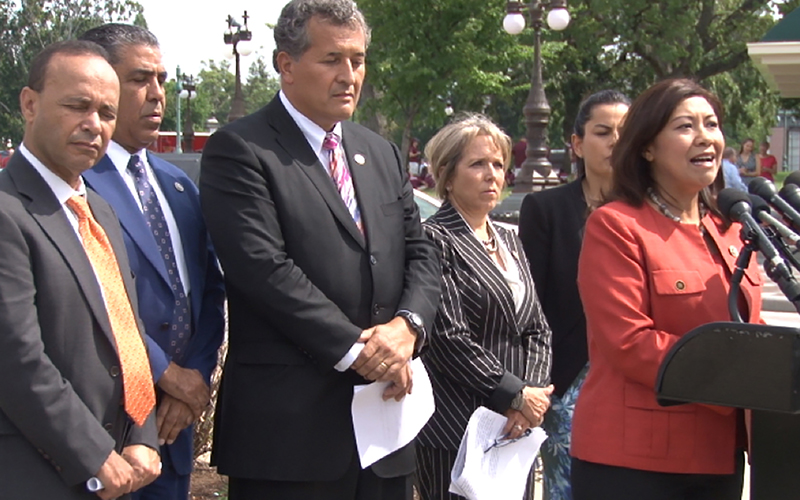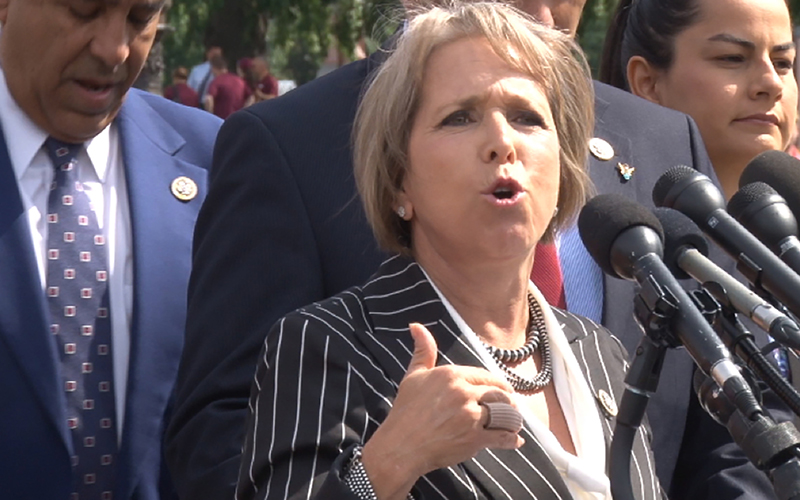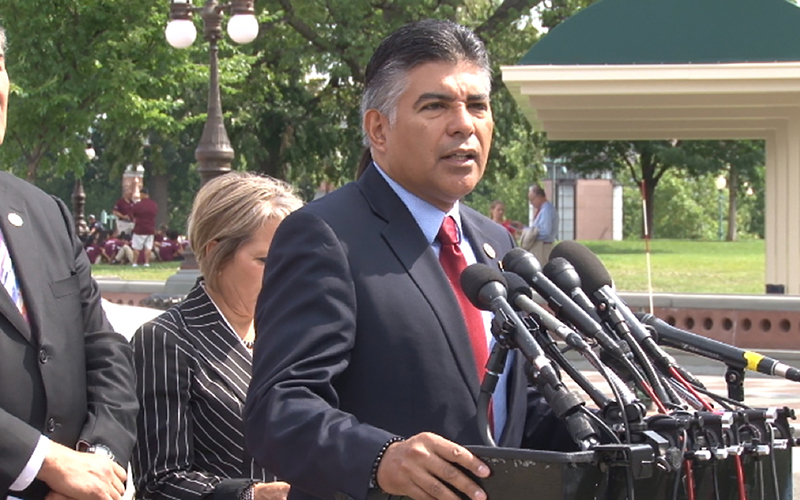
Rep. Norma Torres, D-California, backed by other members of the Congressional Hispanic Caucus who were rallying against pair of immigration bills. (Photo by Alex Valdez/Cronkite News)

Rep. Michelle Lujan Grisham, D-New Mexico, one of the Hispanic Caucus members calling on the GOP to stop Kate’s Law and the No Sanctuary for Criminals Act. (Photo by Alex Valdez/Cronkite News)

Rep. Tony Càrdenas, D-California, said Republicans are telling lies to convince Americans that immigrants are dangerous and not part of this country. (Photo by Alex Valdez/Cronkite News)
WASHINGTON – The House passed immigration bills Thursday that Republicans promised would take criminal immigrants “off the street,” but Democrats said would do little for public safety while having a “chilling effect” on immigrant communities.
The bills – to pull federal funding from sanctuary cities and to toughen penalties for immigrants who repeatedly re-enter the U.S. – were approved largely along party lines, with all but a handful of Republicans supporting and all but a handful of Democrats opposing.
Rep. Andy Biggs, R-Gilbert, said the bills correct a problem of people who “should have been actually in jail, in custody, until they were deported.”
“We think it’s going to be an improvement in public safety because all communities around the country will have measure of safety,” Biggs said. “If somebody is a known criminal, for instance, we’re going to take them off the street.”
See related story:
But Rep. Raul Grijalva, D-Tucson, said in a prepared statement that the bills “expose the hypocrisy of the Republican Party.”
“The Republicans can attempt to mask these bills as necessary measures for our ‘public safety,’ but law enforcement officials all across the country agree that the bills will do anything but protect individuals,” his statement said.
The votes come the same week that victims of immigrant crime, including some from Arizona, were in Washington pressing for action.
Mary Ann Mendoza, a Mesa woman whose son was killed in 2014 by a drunken driver who turned out to have been in this country illegally, was in town to launch Advocates for Victims of Illegal Alien Crime with other survivors Tuesday. The group met Wednesday with President Donald Trump.
And on Thursday, Mendoza and Steve Ronnebeck – whose son was fatally shot in a Mesa convenience store by an undocumented immigrant in 2015 – were scheduled to meet with Attorney General Jeff Sessions.
-Cronkite News video by Alex Valdez.
The Trump administration’s position on the bills was made clear by Homeland Security Secretary John Kelly during an appearance with House Speaker Paul Ryan before Thursday’s vote.
“President Trump has been clear that our borders are not open to illegal immigration, that we are a nation of laws, and we will no longer look the other way. Well, we will no longer look the other way in the interior either,” Kelly said.
The No Sanctuary for Criminals Act would deny federal funding to “sanctuary cities,” local governments that refuse to cooperate with federal authorties to hold or transfer suspects who may be here illegally.
The second bill, Kate’s Law, was named for San Francisco resident Kate Steinle who was killed in 2015 by an immigrant who was in the country illegally. It would impose a range of penalties on those who re-enter the U.S. after being deported. Penalties would start at two years for someone who re-enters and go as high as 25 years and a fine to someone who re-enters after committing a serious crime like murder, rape or kidnapping or “three or more felonies of any kind.”
Ryan said the law is needed to protect people like Steinle, who should not have died and whose killer “should not have been here.”
But members of the Congressional Hispanic Caucus said before the vote that the belief that current laws allow the U.S. to “harbor hardened criminals” is a “blatant lie”
“All oppose violent criminals,” caucus members said at a morning news conference, but the bills voted on Thursday affect millions of other hard-working immigrants who are in the country as well.
“These bills are prime examples of the enforcement-only and anti-immigrant agenda of Trump’s administration,” said Grijalva, a caucus member.
The sanctuary cities bill passed 228-195, with three Democrats crossing the aisle to support it and seven Republicans crossing in the other direction to vote against it. The vote on Kate’s Law was only slightly less partisan, passing 257-167 with all but one Republican House member voting for the bill, but 24 Democrats crossing the aisle to support it.
The results were much the same in Arizona, where Democrats and Republicans split on the sanctuary cities bill but Democratic Reps. Kyrsten Sinema of Phoenix and Tom O’Halleran of Sedona joining Republicans to back Kate’s Law.
Rep. Paul Gosar, R-Prescott, who was present for earlier votes was listed as “not voting” on the final versions of both bills. His office could not be reached for comment Thursday evening.
The bills still need to go through the Senate, but Thursday’s results were hailed by Biggs, who said that “literally thousands, over a 15-month period, of known violent criminals were let onto our street” in Maricopa County under current law.
“These people should not be wandering our streets awaiting some detainer hearing that’s put off indefinitely,” Biggs said. “They should be in custody until they’re deported.”
But Rep. Ruben Gallego, D-Phoenix, had a different response as he walked out of the Capitol after Thursday’s votes. He said the two bills will “spread fear” in immigrant communities.
“It’s just going to be, in general, more stoking of fear of the immigrant community which, on average, has less crime than the non-immigrant population,” Gallego said.